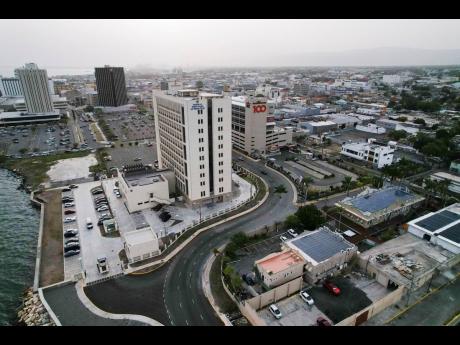Wehby: Diaspora of strategic importance to Jamaica
Continued social challenges plaguing the country have resulted in a growing diaspora, the concept of which one academic has described as complex, but the value of which amounts to billions of dollars in economic contribution through remittances and investments.
Roughly 1.1 million Jamaicans are domiciled overseas, according to the United Nations Department of Economic and Social Affairs’ Population Division (2020), with women accounting for 57.5 per cent of that figure.
The population has almost doubled over a 30-year span, moving from 588,450 in 1990 to 1,118,931 in 2020.
The scattered population of Jamaicans residing in primary destination countries such as the United States, Canada and the United Kingdom is viewed as “complicated” by senior lecturer at the Institute for Gender and Development Studies at The University of the West Indies (UWI), Dr Maziki Thame.
She said this is due to the migration of people who leave loved ones behind.
“We often think about those abroad in terms of their economic contribution through remittances, which is, of course, important because it represents a direct cash transfer for people who are in degrees of deprivation in a context where the state gives minimal social welfare,” Thame said in buttressing her conclusion as she spoke ahead of today’s start of the 9th biennial Jamaica Diaspora Conference.
“But it is our long story of separation – first from Africa then the Caribbean – that is a kind of tragedy. It’s a loss to family, to nation in terms of skills, and for them, we underestimate their adjustment to their situations abroad, which often includes racism,” she added.
But the hallmark of the Jamaican diaspora, GraceKennedy CEO Don Wehby has said, is taking the best of what the nation has to offer and spreading it across the globe.
“The diaspora is of strategic importance to Jamaica as it represents a reservoir of social and financial capital, which must be optimised for national development,” said Wehby, who is also a senator.
Between 2012 and 2021, total remittances to the country increased by 71 per cent, moving from US$2 billion to US$3.5 billion, according to Bank of Jamaica (BOJ) data.
Inflows from the US increased by 104 per cent, moving from US$1 billion to US$2.1 billion, while those from the United Kingdom moved from US$292 million to US$328 million, representing an increase of 12 per cent.
Canada and the Cayman Islands also saw increases of 55 per cent and 41 per cent, respectively, between 2012 and 2021, moving from US$201 million to US$312 million in the case of Canada and US$109 million to US$155 million for the Cayman Islands.
Remittances between 2019 and 2020, when the coronavirus pandemic struck, increased by 20.6 per cent, with flows from the US increasing by 30 per cent, the UK by 15 per cent, Canada by 25 per cent, and the Cayman Islands by two per cent.
Wehby underscored the value of the diaspora in keeping the economy afloat during that period, noting that “without this support from the population during the fall-off in our tourism earnings, Jamaica could have faced a balance of payment challenge due to a reduction in foreign-exchange inflows”.
Difficult to assess contribution
Economist Dr Peter-John Gordon has said that it is difficult to assess the true value of the diaspora because people may also contribute to the island without a direct flow of money, such as through their know-how and ideas.
“A member of the diaspora who is making a large investment in Jamaica, for example, Michael Lee-Chin investing in the National Commercial Bank, would not show up as remittance in the BOJ accounts. Direct foreign investment flows would not identify if the investor is a member of the diaspora or someone else, so we cannot separate investments coming from the diaspora from other foreigners,” the UWI lecturer said.
The Caribbean Policy Research Institute (CAPRI) positions remittances as the best tracked and quantified area of diaspora contributions to the country.
In thousands of instances, remittances serve as income for the neediest in the country, the research institute said, and are the only source of income for many households.
Drawing on a 2010 BOJ survey, CAPRI pointed out that approximately 85 per cent of remittances received were used for paying utility bills and covering basic consumption expenses.
It said remittance also increases the ability of families to get healthcare, education and proper nutrition.
Jennifer Hylton, who considers herself a regular collector of remittance, told The Gleaner that the funds are used to take care of her household and to send her three grandchildren to school.
Their parents reside overseas and often remit money to help with their well-being.
“A lot of people depend on it,” she said.
“Maybe it’s because is Wednesday, you don’t have a lot of people here and because they run out of cash,” she said outside of a GraceKennedy-owned Western Union outlet in the Kingston 11 area recently.
Shannon Campbell has used money remitted from her family in the US to build a house.
“I started last November and I am pretty close to completion,” Campbell said.
Although employed, Dalton Brown told The Gleaner that he depends on remittance to make up the salary shortfall.
“Time hard and the pay alone can’t do it. My family in England send money when they can and I use it to buy food, help with the bills and save for a rainy day,” he said.
Inflows from the UK, according to Gordon, are not rising as fast as the flow from the US, Canada and Cayman.
The economist said most of the migration taking place today is to the US and Canada, with many Jamaicans also going to Cayman.
Obligations towards children and parents are stronger for more recent migrants than for others who left decades ago, he said.
“So it is not surprising that the growth of inflows from the UK would not be as robust as from the other areas. Inflows from the UK were US$13 million more than from Canada in 2020 compared with US$90.5 million more in 2012,” he said.
Exponential growth
Transaction volume for 2021, according to BOJ figures, totalled £1.3 million from the UK, $1.5 million from Canada and $8.3 million from the US.
JN Money, one of the major remittance brands for the country, noted a 219 per cent growth in online transaction volumes during the financial year ending March 31, 2021.
The company said restrictions on the physical opening of several JN Money locations in some diaspora markets because of COVID-19 triggered the increase.
Additionally, the company said it experienced exponential growth in the value of transactions during that period, by 302 per cent.
Between 2017 and 2021, J$77 billion was remitted through VM Money Services according to the company’s CEO, Michael Howard.
“Each transaction received represents an inflow of foreign exchange, which has clear benefits for the Jamaican economy. This has been particularly important over the past two years when remittances formed one of the main sources of foreign exchange for the local economy. Every transaction received is also used to purchase goods or services to sustain a family and household,” he said.
However, BOJ figures for 2022 show net remittance inflows of US$276.5 million, which represents a decrease of 9.4 per cent or US$28.7 million in comparison to March 2021.
“We believe the decrease is due at least in part to global inflation rates. Many people are feeling the pinch and are struggling to meet their daily expenses and are, therefore, unable to send as much money back home as they could before,” said Howard.
“Of course, global conditions have a direct impact on our remittance market, so as inflation increases, remittances will likely decrease. Consider also the rising cost of fuel and the war in Ukraine, the lack of new stimulus payments, and the fact that more persons are travelling home to see their loved ones after two years of little or no contact. These could also be contributing factors,” he said.


